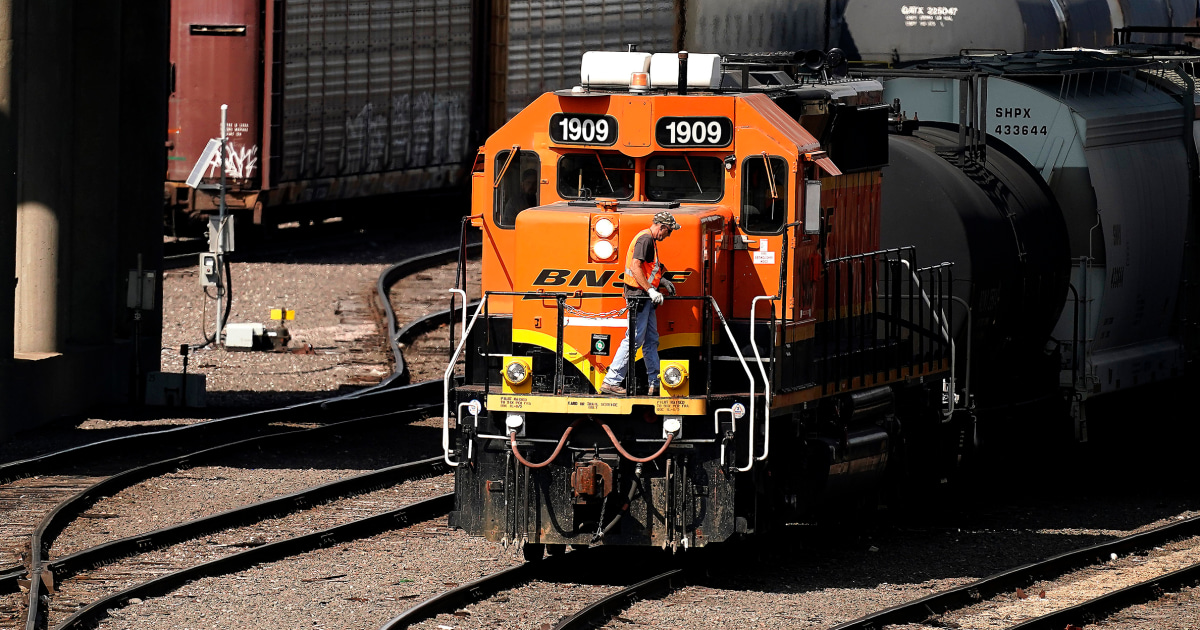Workers at two of the country’s biggest rail unions split over a tentative contract their leaders had hashed out with freight rail companies — leaving open the possibility of a debilitating rail strike in the middle of the holiday season.
Workers at the 24,000-member Brotherhood of Locomotive Engineers and Trainmen, which represents train engineers, voted in favor of the deal.
But the 28,000-member SMART-TD union, which represents rail conductors, was split on the contract. It was the fourth no vote by the unions that have been negotiating with the rail companies.
The no vote is a rejection of the compromise worked out in September between union leaders and the companies with the help of the White House and Labor Secretary Marty Walsh.
Since that compromise, several unions have signaled their discontent primarily over the proposed contract’s lack of fully paid sick leave and other scheduling requirements.
The rail companies and the unions still have two and a half weeks to return to the table to try to iron out a new deal, but if the parties are unable to do so by Dec. 8, the unions could strike the next day.
The vote is the latest reflection of workforce dissatisfaction, compounded by the pandemic and high inflation.
In interviews, many workers across industries expressed frustration at watching benefits instituted during the pandemic expire, such as pay bonuses and sick time. Others point to the staggering financial success of many companies during the global public health crisis — one that saw an untold number of workers fall sick on the job.
But none of these other labor disputes — from strikes at employers such as John Deere and the University of California, to walkouts and new organizing campaigns at companies such as Amazon, Starbucks and Apple — have had the potential to bring such wide swaths of the country’s economy to a halt.
The freight rail system is responsible for about 30% of freight movement in the country, and business groups have been warning for months about the economic fallout from a strike.
The Association of American Railroads, the trade group which represents the rail companies, estimates losses of $2 billion a day. The American Chemistry Council, which represents producers of products such as epoxy, polyurethanes and chlorine, ballparked that a monthlong strike could cost the economy 700,000 jobs and $160 billion and send inflation spiking.
But SMART and BLET workers, the conductors and engineers who staff the system’s trains in two-person teams, have told NBC News in interviews that they are frustrated with scheduling policies instituted by some of the rail companies during the pandemic that leave workers on call nearly 24/7 every day.
The railroad companies say that workers are already well compensated. The 24% raises over five years they agreed to in the last round of negotiations will bring the average pay up to $110,000 by 2024, the Association of American Railroads says.
In general, the freight rail industry enjoys far higher profit margins than other logistics businesses operating by air or ground and industry groups and federal officials, including Surface Transportation Board Chairman Martin J. Oberman, have complained that the companies have been cutting employment and raising prices at the expense of service.
The negotiations are complicated by the detailed set of rules pertaining to rail workers and the large number of parties involved in the negotiations.
Rail workers get to vote on any agreement their leadership makes with the companies. Of the 12 unions that are negotiating contracts with the seven biggest rail companies, members of at least eight have opted to ratify their contracts. Including the split vote from SMART-TD, four have voted no. But if any one of the unions decides to strike, all of the 12 unions will honor it, bringing the system to a halt.
Congress remains another player in the dispute, with the potential to step in and force an agreement or end a potential strike. Congressional Democrats have been tight-lipped about their plans in the event that negotiations fail.
Share your story or advertise with us: Whatsapp: +2347068606071 Email: info@newspotng.com












